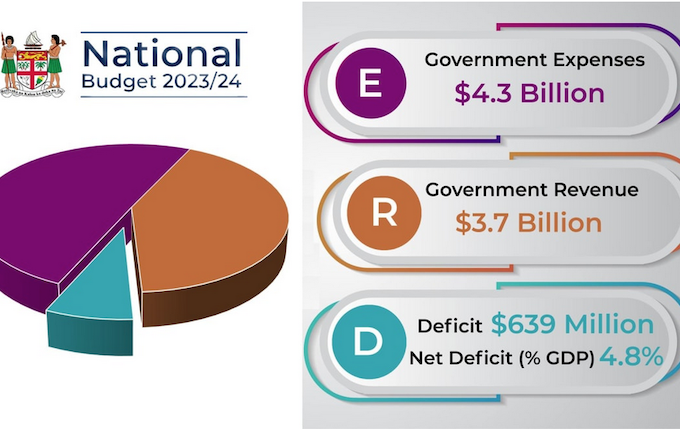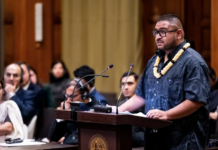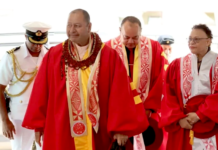
By Rachael Nath, RNZ Pacific journalist
The Fiji government has announced its “rebuilding our future together” Budget with a spend of FJ$4.3 billion (NZ$3.2 billion) to address the high cost of living and pay for the hefty bill racked up by the former FijiFirst administration and the global pandemic, coupled with multiple tropical cyclones and the effects of Russia’s war on Ukraine.
Deputy Prime Minister and Minister of Finance Professor Biman Prasad said the focus of the budget was navigate the country from its economic crisis to provide a better standard of living for its people.
Professor Prasad said the deficit was higher than he wanted and nearly 25 percent of the budget would go to servicing debt.
“We have too much government debt for the size of our economy and that remains one of our biggest challenges. We must continue to carefully manage our revenue spending.”
He said the budget “stabilises revenue and debt level and puts the country on a sustainable path”.
Financial summary
Total government expenditure for the 2023/2024 Budget is $4.3 billion with a projected revenue of $3.7 billion — a deficit of $639 million. Fiji starts July with a debt-to-GDP ratio of almost 88.8 pecent.
Here’s a list of the major spending and projects:
Tax policies
Increases
- Value Added Tax increases to 15 percent on most food, with the intension to pump an estimated $446m into the economy.
- 5 percent increase to the excise tax on alcohol and tobacco.
- The excise on carbonated/ sugar-sweetened beverages will be increased from 35 cents per litre to 40 cents per litre.
- A domestic excise of 40c per kilogram or per litre, and import excise of 15 percent, will be introduced on carbonated drinks, ice cream, sweet biscuits, snacks, and sugar confectionery.
- Motor vehicle import excise duty will increase on all new and used passenger vehicles by an additional 5 percent.
- The corporate tax rate will increase from the current 20 percent to 25 percent.
- New companies eligible for reduced corporate tax for listing on the South Pacific Stock Exchange will have their tax rate increased from the current 10 percent to 15 percent. This will be for new companies and only for a period of seven years. These corporate tax rate increases will add about $73.5m in revenue.
- Departure Tax will increase from the current $100 to $125 effective from August 1 and will further increase by an additional $15 to $140 effective from January 1, 2024. This will add a total of $30m towards overall tax revenues.
Reductions
- 21 basic food items continue to attract zero VAT with the inclusion of prescribed medicine to the list.
- Reduction in fiscal duty from 32 percent to 15 percent on canned mackerel (except canned tuna), corned mutton, corned beef and beef products, canned tomatoes, prawns and duck meat.
- Fiscal duty on sheep/lamb meats will be reduced to zero. For beef meat the duty is being reduced from 32 percent to 15 percent.
- Reduction in import excise on chicken portions such as wings, drumsticks, feet, thighs, etc from 15 percent to 0 percent.
- Concession on smartphones will be removed and replaced with a fiscal duty of 5 percent.
Education
- Education gets the highest allocation in this budget – $845m.
- Biman Prasad announced all Tertiary Scholarship and Loans Service debt — $650m owed by more than 50,000 students — is written off. But it comes with the caveat that these students will have to save a bond. The bond savings will be years of study multiplied by 1.5, and those who choose not to save the bond will have to pay the equivalent cost amount.
- The rebranded Fijian scholarship scheme will have a total budget of $148.2m.
- The salaries budget for the Ministry of Education increased to $322.6m, to cover existing teachers and 179 new teaching and non-teaching positions.
- There is $8.9m for salary upgrades for teachers completing qualifications for higher pay.
- $5.7m for the rural and maritime teaching allowance budget.
- Free education and transport assistance to ECE, primary and secondary school students, with a total funding allocation of more than $100m.
- There is also money for back to school support, and maintenance and upgrading of schools.
- Investment in the technical colleges, working together with existing service providers, including the newly established Pacific Polytech.
- A revamp the apprenticeship scheme in the next few months and also review the NTPC Levy and how best to support and fund skill upgrades in the workforce.
- Tertiary institutions get $103.3m, the grant for the University of the South Pacific is restored, and they have allocated extra money towards clearing the USP outstanding grants.
- There is also an extra $500,000 for Sangam Institute of Technology to accommodate additional nursing students, “in light of the current shortage”.
Health and disability
- Health Ministry is allocated a budget of $453.8m, a significant increase of $58.7m from the previous budget.
- Salaries and wages budget for the Health Ministry has increased to $126.4m.
- This will cater for 250 intern nurses to move up to become registered nurses; 237 new intern nurses; 46 nursing assistants; 50 nursing aides; 40 midwives; 94 medical laboratory scientists; and additional support staff in various hospitals and non-medical officers for the Fiji Pharmaceutical & Biomedical Services to strengthen capacity and improve procurement efficiency.
- Nursing assistant and nurse aide positions have been created to support the nurses’ focus on their core role, where these aides and assistants will take over the non-clinical responsibilities like making the bed, getting the consumables etc. The government is also providing $11.6m for the upgrade of nurses’ salaries and overtime.
- $63m has been allocated for public health programmes, Emergency Radiology and Laboratory Services, procurement of drugs, consumables, medicines, and purchase of bio-medical equipment and accessories.
- $2.5m is allocated for the Kidney Dialysis Treatment Subsidy. The allocation has been increased by $1m from this year’s level to cater for the increase in the dialysis subsidy from the current $150 per session to $180.
- $16.4m is allocated for the upgrade and maintenance of urban hospitals and institutional quarters, permanent walkway for the maternity hospital at CWM, purchase, installation and replacement of ICT equipment, and a major interior upgrade of Labasa hospital.
- From August 1, only patients with a combined household income of $30,000 or less per annum can qualify for the free services at private practitioners.
Tourism
- Tourism Fiji is allocated an operating grant of $7m and to support new marketing strategies an increased Marketing Grant of $30m is provided in the new financial year.
Infrastructure, roads and water
- $200m has been allocated for the maintenance of hospitals, health centres, schools, public buildings, government quarters, roads and bridges and water infrastructure.
- The water sector will have an increased budget of $250.8m. This is a major increase of almost $60m compared to the current budget.
- $51.2m has been allocated for the completion of the Viria water project. The total cost of the project is approximately $400m.
- Government is working with the Asian Development Bank for a major institutional revamp of the Water Authority, including governance, investment planning, asset management, infrastructure replacement and upgrade, review of water tariffs, investment in people and improving customer service management. This will cost over $500m to replace the 40-year-old pipe system which is leaking underground.
- An increased allocation of $100.6m is allocated for road maintenance.
- Fiji Roads Authority is allocated a budget of $387.6m which comprises $14.7m for operations and $372.9m for capital expenditure.
- In the last eight years, a total of around $3.1b was spent by the road authority without any strategic plan, without much priority and without proper costing.
- $82.2m for the Transport Infrastructure Investment Sector Project financed through Asian Development Bank and World Bank loans of US$100m and US$50m, respectively.
- Public Works, Meteorological Service and Transport Ministry is allocated a sum of $98.3m.
- Government has also re-established the Public Works Department (PWD) to improve the state of rural roads around the country with an initial setup cost of $5m.
Social welfare and pension
- Ministry of Women, Children and Social Protection funding allocation has increased from $147.7m to $200.2m.
- More than 90,000 thousand people on social welfare will directly benefit from increased monthly allowances of 15 and 25 percent.
- $100,000 is allocated to cater for the establishment of a new Department of Children.
- $19.9m has been allocated for the Child Protection Allowance. This is an increase of $6.2m.
- The Family Assistance Scheme is allocated a budget of $45.6m. This is an increase of $11.5m from the current financial year. A total of 26,000 households are expected to be assisted in this financial year.
- $43million is allocated to cater for disability allowance, bus fare subsidy for elderly and disabled, electricity subsidy to households below $30,000 income and insurance for social welfare recipients. Over 100,000 people are expected to benefit from this.
- Those aged 70 years and above, and on the social pension system, will receive a 25 percent increase in allowances. This means the monthly allowance will increase from $100 a month to $125 a month effective August 2023. Those between the age of 65 to 69 years will have their monthly allowances increased from $100 to $115.
- The social pension scheme is allocated a large budget of $78.2m, an increase of $23.2m to cater for the needs of 54,200 senior citizens.
- Effective from August 2023, the 1,500 FNPF pensioners who had their pension rates reduced by the military regime will be able to access the Government social pension allowance of $125 if they are above the age of 70 or $115 if they are between 60 to 69 years.
Civil service and cutbacks
- Review of the current minimum wage rate to be done in the next financial year.
- The government is working together with the workers’ representatives to review the overall pay and benefits of the civil servants.
- In the next six to nine months, government will review the civil service remuneration and pending the review, the salary structure of the civil service will be readjusted to be commensurate with the work the civil servants are doing for the nation.
- Government ministers have taken a 20 percent pay cut; they are significantly cutting down ministerial travel allowances put in place by the previous government.
- Travel allowance of the Prime Minister, the current 250 percent per diem loading, will be reduced to 100 percent.
- Ministers will have their top-up reduced from 200 percent to 50 percent.
- For assistant ministers the top-up will be reduced from the current 100 percent to 25 percent.
- Apart from these major reductions, Government will remove “all the exorbitant incidental allowances that are currently provided”.
Culture and arts
- Ministry of iTaukei Affairs, Culture, Heritage and Arts has been allocated a budget of $38.6m, a major increase of $23.2m from this year’s allocation
- To strengthen iTaukei administration and provincial councils, a grant of $10.8m is allocated to fund the 14 provincial councils, including $4.3m to fund the salaries and wages of 182 provincial council officers and other operational expenses of around $6.1 million.
- The Turaga-ni-Koro monthly allowance will be increased from $100 to $150 per month for all 1,181 Turaga-ni-Koro for which a total sum of $2.1 million is allocated.
- The Mata-ni-Tikina quarterly allowance will be increased by $150 per quarter, which is equivalent to an increase of $50 per month for the 262 Mata-ni-Tikina.
- $4m is allocated for iTaukei Land Development to help landowners with the development of their land for commercial purposes.
- To recognise and support the Turaga-ni-Yavusa in decision-making and Vanua administration, a monthly allowance of $100 has been allocated for 648 Turaga-ni-Yavusa under the Vanua Leadership Allowance with a sum of around $800,000.
Agriculture and Sugar
- Ministry of Agriculture and Waterways is allocated a budget of $95.2 million in this budget which is an increase of $37.3 million.
- For the first time, the government will be providing weedicide and fertilizer subsidy for non-sugar crops which includes rice, ginger, dalo, and cassava, with a funding of $1m to boost production of these crops.
- The Ministry of Multi-Ethnic Affairs and Sugar Industry is allocated a sum of $51.7m in the new financial year, of which $49.7m is for the sugar unit.
- With the aim to increase cane production from current production of 1.6m tonnes to 1.9m tonnes by 2024 season, a sum of $11m is allocated for the Sugar Development and Farmers Assistance Program, New Farmers and Lease Premium Assistance, Weedicide Subsidy, Farm Incentive Program and Cage Bins.
Fisheries, land and SME
- Ministry of Fisheries and Forestry is allocated a budget of $41.6m. This will support the expansion of aquaculture, shrimp farming, seaweed Development Programme, Multi-Species Hatchery, construction of ice plants and the supply of tilapia fingerlings and prawn frys to farmers in the Western Division.
- Ministry of Lands and Mineral Resources is allocated a budget of $30.1m to enable the Ministry to continue effectively and efficiently administer and regulate the land and mineral resource sector
- Ministry of Trade, Co-operatives and Small Medium Enterprises and Communications is allocated a budget of $116.5m in the next financial year, an increase of $25.3m from this year’s allocation.
















































